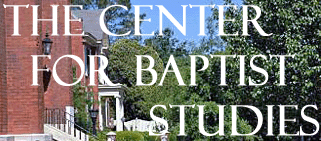|
Encouraging scholarship, strengthening faith identity, and interpreting contemporary issues in Baptist life. |
||
 |
|
Conferences: |
|
Home • Staff • Local Church • News & Views • Issues • Bulletin • Conferences / Seminars • Sabbaticals • Certificate • Links |
||
|
Introduction My objectives in this presentation are to describe Fundamentalism fairly, to argue that Fundamentalism is not the only authentic expression of Christian faith, and to offer suggestions about how progressive Baptists can relate to Fundamentalists. It is now conventional to use the word “fundamentalists” to refer to religious extremists and terrorists. This has led Bob Jones III to say that he will no longer refer to himself as a Fundamentalist. Scholars are troubled by the vagueness of this use of the word “fundamentalists.” In the largest study we have of fundamentalism, the five-volume set called The Fundamentalism Project, Martin Marty and Scott Appleby wrote that they decided to retain the word because a word is needed, this one is in use, and no other one seems better. A word is needed because fundamentalisms in the various religions have family resemblances. Here are nine of the family traits. Fundamentalist movements originate in religion. They make a selective use of their religious traditions. They react against aspects of the modern world. They feel they are under siege and in a time of crisis. They fight modernity. They follow authoritarian male leaders. They see the past as better than the present and the future as a time when their views will prevail. They create definite boundaries between themselves and outsiders. They work toward control of their society, not toward coexistence with their enemies. The Original Fundamentalism Fundamentalism began among Protestants in America. Evangelical Protestants were the dominant group in America in the 19th century, but they spent a lot of time arguing with each other over which was the true church. Through the 19th century this situation changed in response to four challenges. The first challenge arose from the Enlightenment whose characteristic emphases were individualism, reason, freedom, and progress. The second challenge came from the historical-critical study of the Bible. It was historical because its interpretation of the Bible took seriously the historical setting of the writings. It was critical because its practitioners put their own questions to the text. The third challenge came from biological evolution. The fourth challenge arose in liberal Protestant theology, which was Protestant theology which had accommodated the Enlightenment, the historical-critical study of the Bible, and evolution. It was expressed not only in theological monographs but in the many biographies of Jesus and also in the social gospel. The challenges appeared gradually, and Protestants responded in various ways. Some accepted themes from the challenges. Others wrote books opposing the challenges. Albert Schweitzer did this in the Quest of the Historical Jesus (1906), and Karl Barth did it in his commentary on Romans (1919). In America, many Protestants responded to the challenges by setting aside their denominational differences in order to organize a common front to oppose the challenges, which they called “liberalism” and which they understood to be the thin edge of the wedge of secularism and therefore a grave threat to the faith and life of the church. This was the original Fundamentalism, and in 1920 one of its proponents, Curtis Lee Laws, coined the word “Fundamentalists” to refer to himself and his friends who intended “to do battle royal for the fundamentals.” Fundamentalism is a loose coalition of co-belligerents in a struggle against liberalism. It is widely assumed that Fundamentalism was Southern, rural, and anti-intellectual, but, in fact, it was stronger in the North than in the South, it was stronger in urban than in rural areas, and some of its original leaders such as J. Gresham Machen were intellectuals. When Fundamentalism began, its proponents felt a sense of entitlement to exercise hegemony in American life. In the 1920s they were shocked to lose a series of battles and to find themselves no longer exercising cultural hegemony. In the 1930s most of them withdrew from their denominations, their leadership became less intellectual, and they almost disappeared from public life, but in fact they were flourishing as a subculture. In the 1940s a group of Fundamentalists who were critical of aspects of Fundamentalism separated from the movement; these are evangelicals such as Billy Graham. In the late 1970s Fundamentalism reappeared as a political force in American life with Jerry Falwell and the Moral Majority. Today Fundamentalism is an influential movement in the nation. The Theology and Attitudes of Fundamentalism Even though theology is important to Fundamentalists, it is difficulty to pin down the theology of Fundamentalism because the Fundamentalist coalition is so diverse and so loose. The twelve pamphlets called The Fundamentals (1910-1915) contain 90 articles and represent an early and generous version of Fundamentalism. One of the articles, on religious experience, was written by E. Y. Mullins. Many of the articles are polemical in character, that is, they are defenses of traditional beliefs against revisionist presentations in liberalism. Another representative presentation of the theology of Fundamentalism is known as “the five fundamentals.” Its story is complicated. In 1910 the General Assembly of the Northern Presbyterian Church endorsed five points of doctrine: the inerrancy of the original manuscripts of the Bible, the virgin birth of Christ, the penal substitutionary interpretation of Christ’s passion and death, the bodily resurrection of Christ, and the authenticity of the miracles recorded in the Bible. In the 1920s the phrase “the five fundamentals” was sometimes used of these five and sometimes used of revised versions which included the deity of Christ and/or the premillennial return of Christ. The Fundamentals and the five fundamentals are not balanced presentations of the fundamentals of the Christian faith. They are unbalanced because they are polemical responses concerning the doctrines which Fundamentalists felt were threatened by liberalism, rather than theological presentations of the true fundamentals of the Christian faith. Just as war is too important to be left to the generals, so the fundamentals of our faith are too important to be left to the Fundamentalists. It has often been observed that the attitudes of Fundamentalism are even more distinguishing than their doctrines. These include suspicion, fear, anger, and divisiveness, and they are not ideal attitudes for Christians who are called to have trust in God and to love one another. Fundamentalism and Southern Baptists In the early twentieth century, liberalism was not as threatening to Southern Baptists as it was to denominations centered in the North, and very few Southern Baptists were alarmed about liberalism. When efforts were made to recruit Southern Baptists for the Fundamentalist movement, most Southern Baptists resisted and felt that their traditional Baptist theology was a better defense against secularism than Fundamentalism. The greatest Fundamentalist leader among Southern Baptists was J. Frank Norris of the First Baptist Church of Fort Worth. Even his enemies acknowledged that he was a powerful preacher and leader, and even his friends acknowledged that he was combative. Despite their general resistance to Fundamentalism, Southern Baptists were not impervious to Fundamentalist influences, and in time, some Southern Baptists came to feel that the Baptist tradition was in fact a Fundamentalist tradition. The controversy that began in the Convention in 1979 led to the replacement of all of the leaders of Convention institutions. It is conventional to describe the new leaders of the Convention as Fundamentalists and to say that they are leading the Convention in Fundamentalist directions. The rhetoric is understandable, but is it accurate? To answer that question, let us consider four factors: personal connections between the earlier Fundamentalism and the new directions in the Convention, characteristics of generic fundamentalism, the themes of Fundamentalist theology, and the attitudes of Fundamentalism. There are connections between the earlier Fundamentalists and the new directions in the Convention. For example, Jerry Falwell’s Thomas Road Baptist Church now contributes to the Cooperative Program and therefore is a member church of the Convention. A review of the characteristics of generic fundamentalism suggests that they are descriptive of the new directions in the Convention. The origins of these directions is religious. The new leaders make selective use of their tradition. The new directions are reactions to aspects of modernity. The new leaders felt that the faith of the Convention was at risk and acted militantly against the threat. The new directions are being implemented by authoritarian male leaders. The new leaders felt that the past was better than the present and that in the future their views would prevail. The new leaders have set definite boundaries between insiders and outsiders, and they worked for control of the Convention rather than for coexistence with their opponents. The new leaders of the Convention are sympathetic to doctrines associated with Fundamentalism, which one of them memorably described as “the Bible, the blood, and the blessed hope.” The attitudes of suspicion, fear, anger, and separatism were certainly at work during the controversy, and they continue to play a role in the new directions in the Convention. In view of this it is accurate to describe the directions of Convention today as Fundamentalist, though we should remember that the word itself is now pejorative and offensive. Relating to Fundamentalists Most of us will be relating to Fundamentalists in our families, our churches, our social clubs, and our communities. In order to make our relationships as Christian as possible, we must be secure in our faith; if we are not, Fundamentalism will threaten us and we are likely to become angry and to be tempted to be unkind and to retaliate against Fundamentalists. Fundamentalists are fellow Christians; however much their attitudes or actions may disturb us, what we have in common with them–trust in Jesus as Savior and Lord–is more important than what divides us from them. Those among us who have been hurt by Fundamentalists will have to do the difficult but necessary work of forgiving them (this does not mean we must remain in harm’s way). Many of us need to avoid conversations with or about Fundamentalists in order to give ourselves time to heal from the hurts we have experienced. Many of us will have occasions when, in order to act responsibly, we must resist Fundamentalism, and some of us will have occasions when it is appropriate to engage in civil conversation with individual Fundamentalists. All of us need to work to insure that the Fundamentalist/Liberal dialectic does not dominate our thinking. Conclusion Traditional and progressive Baptists share with Fundamentalists a determination to resist secularism, but we do not feel as threatened by the Enlightenment, historical-critical biblical criticism, evolution, and liberal theology as Fundamentalists, because we do not see these as intractably secular. There are things in the Enlightenment to be welcomed, such as the emphasis on freedom, and things to be resisted, such as excessive individualism. The same thing is true of the historical-critical study of the Bible, of evolution, and of liberal theology. I
believe a better account of the fundamentals of our faith can be offered
by speaking of monotheism, creation and the Fall, the Trinity and the
Incarnation, the gospel, the gift of the Spirit and the mission of the
church in word and sacrament, Christian hope, and Holy Scripture. This is
tradition “in its power and fullest sense” rather than as a “lifeboat in
which to escape the present,” as Rowan Williams, the Archbishop of
Canterbury, has expressed it. I also believe that the traditional Baptist
emphasis on freedom is more fundamental than Fundamentalists realize. The
Trinitarian God is the first fundamental in theology and faith, hope, and
love are the first fundamentals in ethics and attitudes. |
||
|
The Center for Baptist Studies, Mercer University, 1400 Coleman Avenue, Macon, GA 31207 Phone (478) 301-5457 |
||
